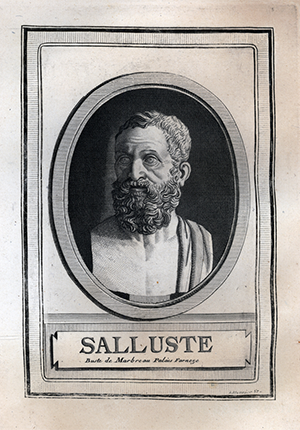Historic Document
The Jugurthine War (ca. 41-40 BC)
Sallust | 41-40 BC

Public domain
Summary
Gaius Sallustius Crispus (86-ca. 35 BC) was the author of The Conspiracy of Catiline, The Jugurthine War, and Histories. Sallust, as he has long been called, was a younger contemporary of Cicero and an admirer, partisan, and protege of Julius Caesar. After serving as a praetor at Rome and as a proconsul in north Africa, he retired from politics and, in his later years, turned to history, taking Thucydides as his model. It was at this time that he penned the two monographs mentioned above, which survive, and his Histories, from which we have only fragments. In what remains of Sallust’s works, no passage had as a great an impact on England’s radical Whigs and on the Founding generation in America as the account of republican Rome’s emergence, rise, and decay embedded in the introductory section of The Jugurthine War.
Selected by

Paul Rahe
Professor of History and Charles O. Lee and Louise K. Lee Chair in the Western Heritage at Hillsdale College

Jeffrey Rosen
President and CEO, National Constitution Center

Colleen A. Sheehan
Professor of Politics at the Arizona State University School of Civic and Economic Thought and Leadership
Document Excerpt
The Jugurthine War—7-11:
[After the overthrow of the monarchy], all Men began with greater Zeal to exert themselves in their Stations; all Men more readily to display their several Abilities. For, to the Jealousy of lawless Kings, the Virtuous are much more obnoxious than the Vicious; and in their Eyes virtuous Merit appears always dreadful. But how much the City, now she had acquired Liberty, increased in a small time, is incredible to be told; so powerfully had a Passion for Glory possessed the Hearts of her Citizens!
The Roman Youth, the Moment they could bear Arms, repaired to the Camp, where, under hard Fatigues, they acquired by Practice the Art of War: And greater was their Delight in their military Dress and War-horses, than in lewd Women and Banquetting. . . . They were covetous of Applause, but liberal of Money. They sought only a moderate Degree of Wealth; but Glory without Bounds.
I could here recount upon what Occasions the Roman People have routed mighty Armies with a Handful of Men; as also what Cities, strongly fortified even by Nature, they have taken by Assault; but that the Detail would lead me too far from my Undertaking.
Yet surely it is Fortune which bears supreme Sway in all things: It is she that, following Caprice rather than Justice, brightens or darkens all the Affairs and Actions of Men. . .
[S]ince all the[] [Roman People’s] ablest Men were likewise the most active, and therefore most employed. None applied their Talents but jointly with bodily Application. Every Man excelling in Worth, preferred Doing to Saying . . . .
Sound Manners, therefore, were promoted both in the City, and the Camp. The most cordial Union every-where prevailed, and no selfish Pursuits. They were determined to Equity and Right, not more by the Force of Laws, than by a natural Propensity. The only Strife, the only Dissentions and Disputes which they exercised, - they exercised against the public Enemy. All the Contests between Citizen and Citizen were in Deeds of Bravery. They were magnificent in their Oblations to the Deities; in their Families very frugal; in their Friendships very faithful. By two principal means, Valour in War, and righteous Conduct during Peace, they supported their own Reputation, and that of the Common Weal . . . ; whilst, in time of Peace, they sustained their Power more by the Influence of Favours than of Fear: And, when they were injured, they chose rather to forgive, than to seek Revenge.
But when, by a Course of Industry and Justice, the Commonwealth was grown powerful; when mighty Kings were vanquished in War; when several Nations, very fierce and wild, were tamed, and many potent People had yielded to her superior Might; when Carthage, that Rival to the Empire of Rome, was utterly demolished, and now Sea and Land lay every-where open to her Sway; then began Fortune to exercise her Tyranny, and to introduce universal Confusion. The same People who had, without Regret, undergone Fatigues and Dangers, Distresses and Hardships, were baned by a Life of Ease: The Romans became depressed by Riches, which are the great Idol and Pursuit of other Nations.
Thus the Lust of Money first prevailed; next a Passion for Place and Sway. These were the Sources of all the Evils which followed. For, Avarice abolished all good Faith, and all Probity, with every other worthy Principle. Instead of these, it inspired Pride and Inhumanity, Contempt of the Gods, and a Spirit of unbounded Venality. Reigning Ambition generally forced Men to be deceitful, to conceal their real Meaning; to profess, what they meant not to estimate Friendship and Enmity, not according to their own Weight, but by that of Lucre, and rather to bear a fair Countenance than an upright Heart.
These Depravations at first gained ground by Degrees, and were sometimes damped by Correction. At last, Corruption spreading like a Pestilence, the City became utterly changed, and the Administration, from the most righteous and fatherly, grew violent and insupportable.
I own, that at first Ambition had a greater Share than Avarice in influencing the Spirits of Men, and is indeed a Vice which bears some Resemblance of Virtue; since all Men alike, the Worthy as well as the Worthless, covet Glory, Preferments and Power. The Difference is, that the former employ direct means; the others, wanting just Abilities, betake themselves to Craft and Frauds. The Object of Avarice is Money; for which no wise Man ever entertained a Passion. This Vice, as if impregnated with every deadly Poison, unmans Body and Soul: It is ever boundless, ever insatiable; nor is its Rage more abated by Affluence than by Want.
But when Sylla had by Strength of Arms recovered the Administration from the Plebeians, and his fair Beginnings had produced such guilty Events, all his Followers grew eager for Spoil and Rapine: One coveted a House, another was greedy of Land: Each seized what he liked: The conquering Soldiery observed neither Moderation nor Measure, and treated the Citizens with brutal Abuse and Barbarity. What heightened these Evils, Sylla, to engage the Affections of his Army, which he had commanded in Asia had, against all the Rules of our Ancestors, indulged them in great Delicacy, and excessive Latitude: The warlike Tempers of the Soldiers, now unemployed, became easily softened, by their delicious Quarters, by Pleasure, and Luxury. There the Roman Soldiery became first habituated to Drunkenness and Amours; to admire Statues, Pictures, and Sculpture; to make Spoil of all tilings, as well by open Violence as by Stealth to ravage the Shrines and Sanctuaries of the Deities; and, without Distinction, to devour and contaminate all things sacred and profane. A Soldiery therefore thus disposed, and withal Conquerors, were sure to leave nothing to the vanquished. Even the Hearts of wise Men are unmanned by Success: How should Forces so debauched temper Victory with Moderation?
When Riches began to pass for Worth and Honour; when Glory, Command, and great Sway waited upon Riches; then Virtue began to languish; Poverty to be held contumelious; Innocence of Life to pass for nature. Thus Luxury, Voraciousness, and Pride, all arising from the common Root of Riches, captivated the Minds of the Roman Youth: They rioted in Rapine and Prodigality; despised what was their own, coveted what belonged to others; banished Shame, Friendship, and Continence; confounded things divine and human, and were regardless of all Circumspection and Restraint. . . .
By such Depravations, the Roman Youth, when they had exhausted their Fortunes, were instigated to all Enormities. For, their Minds, poisoned with evil Habits, wanted Force to resist their Appetites; and were therefore the more furiously abandoned to all Extravagances, and to all the means of supplying them.




